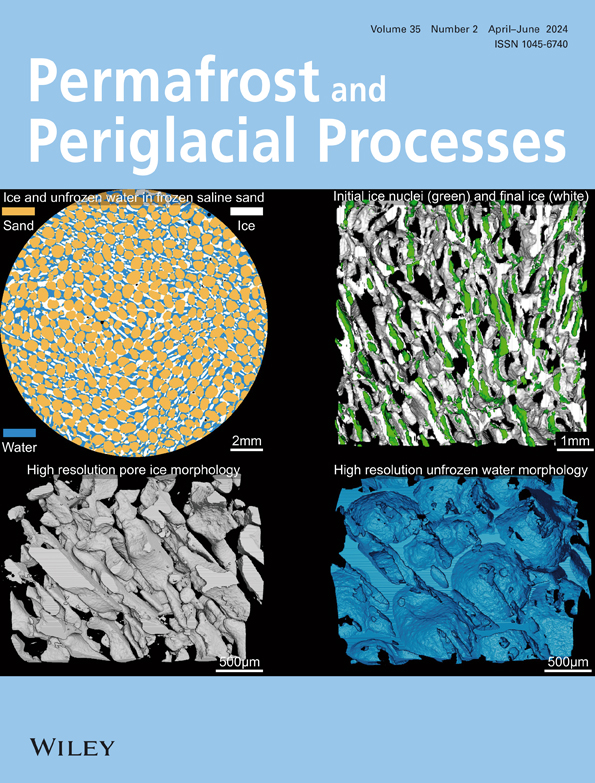巴塔盖特大滑塌:多年冻土沉积、第四纪环境史和近期发展综述
IF 3.3
3区 地球科学
Q2 GEOGRAPHY, PHYSICAL
引用次数: 0
摘要
位于俄罗斯雅库特北部亚纳高地的巴塔盖巨型冰川是世界上已知的最大的逆融解滑坡。滑塌暴露了一个显著的冰期永久冻土序列,记录了在过去650 ka或更长时间内,在一个间断性森林覆盖的山坡上,崩塌、风成和冰缘过程的相互作用,以响应冰川-间冰期时间尺度上的气候变率。从永久冻土层中发现了许多更新世和全新世哺乳动物的骨骼、牙齿和偶尔出现的尸体。大块体的发育经历了几十年的历程,经历了3个阶段:(1)冲沟发育阶段,(2)融塌发育阶段,(3)大块体发育阶段。经过20世纪40 ~ 60年代对针叶林植被覆盖的干扰,60年代初形成山坡沟壑。20世纪80年代,沟壑区中部开始出现融化滑坡,90年代滑塌规模扩大至特大块体(100 ~ 20公顷)。到2019年,塌落区面积约为80 ha,塌落面上方的顶壁高度约为55 m。滑塌生长的主要地貌过程是顶壁消融和热侵蚀,在滑塌底板上形成了独特的冰荒地地形。虽然巨块体的大部分目前正在快速生长,但它最终可能会稳定下来,成为一个不规则的地形,其特征是由荒地退化形成的砂脊和填沙的细长洼地。Batagay巨型岩块与加拿大西北部巨型岩块的比较揭示了它们在地貌、永久冻土沉积和第四纪历史方面的一些相似和不同之处。本文章由计算机程序翻译,如有差异,请以英文原文为准。
Batagay megaslump: A review of the permafrost deposits, Quaternary environmental history, and recent development
The Batagay megaslump, in the Yana Uplands of northern Yakutia, Russia, is the largest known retrogressive thaw slump in the world. The slump exposes a remarkable sequence of Ice Age permafrost deposits that record the interaction of colluvial, eolian and periglacial processes on a hillslope episodically forested during the last 650 ka or more in response to climate variability on glacial–interglacial timescales. Numerous bones, teeth, and occasional carcasses of Pleistocene and Holocene mammals have been recovered from the permafrost. The megaslump developed over the course of several decades in three stages: (1) gullying, (2) thaw slumping, and (3) megaslumping. After disturbance to the taiga vegetation cover in the 1940s–1960s, a hillslope gully formed by the early 1960s. The gully initiated thaw slumping along its central part during the 1980s, with the slump enlarging to megaslump (>20 ha) proportions during the 1990s. By 2019, the area of the slump had reached about 80 ha and its headwall above the slump floor was up to about 55 m high. The main geomorphic processes of slump growth are headwall ablation and thermal erosion, producing a distinctive terrain of icy badlands on the slump floor. Though much of the megaslump is rapidly growing at present, it will probably stabilize eventually as an irregular terrain characterized by sandy ridges and sand‐filled elongate depressions formed by degradation of the badlands. Comparison of the Batagay megaslump with megaslumps from northwest Canada reveals several similarities and differences in terms of their geomorphology, permafrost deposits, and Quaternary history.
求助全文
通过发布文献求助,成功后即可免费获取论文全文。
去求助
来源期刊
CiteScore
9.70
自引率
8.00%
发文量
43
审稿时长
>12 weeks
期刊介绍:
Permafrost and Periglacial Processes is an international journal dedicated to the rapid publication of scientific and technical papers concerned with earth surface cryogenic processes, landforms and sediments present in a variety of (Sub) Arctic, Antarctic and High Mountain environments. It provides an efficient vehicle of communication amongst those with an interest in the cold, non-glacial geosciences. The focus is on (1) original research based on geomorphological, hydrological, sedimentological, geotechnical and engineering aspects of these areas and (2) original research carried out upon relict features where the objective has been to reconstruct the nature of the processes and/or palaeoenvironments which gave rise to these features, as opposed to purely stratigraphical considerations. The journal also publishes short communications, reviews, discussions and book reviews. The high scientific standard, interdisciplinary character and worldwide representation of PPP are maintained by regional editorial support and a rigorous refereeing system.

 求助内容:
求助内容: 应助结果提醒方式:
应助结果提醒方式:


